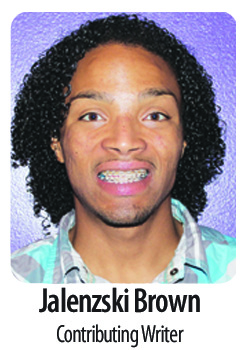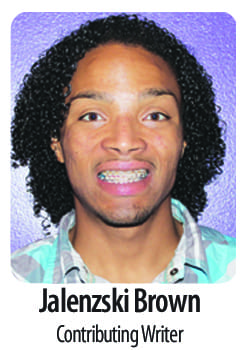Dallas Southern Pride gives black LGBT people a chance to celebrate their unique heritage, culture
 Dallas Southern Pride, aka Dallas Black Gay Pride Weekend, takes place Oct. 2-6, two weeks after Dallas’ larger gay Pride celebration featuring the Alan Ross Texas Freedom Parade and the Festival in Lee Park.
Dallas Southern Pride, aka Dallas Black Gay Pride Weekend, takes place Oct. 2-6, two weeks after Dallas’ larger gay Pride celebration featuring the Alan Ross Texas Freedom Parade and the Festival in Lee Park.
People often wonder why the two Pride celebrations occur on separate weekends. So lets explore some of the history behind and importance of a Black Gay Pride
celebration in Dallas.
We can trace the roots of what are now called gay Pride celebrations in the U.S. back to the demonstrations inspired by the Stonewall Riots in 1969. The high-energy, emotional riots often resulted in violence and other unintended, negative consequences.
The LGBT community in New York City eventually realized the ineffectiveness and destruction of the rioting, but at the same time discovered the power of gathering in numbers. As a result, gay, lesbian, and transgendered individuals — along with many others — gathered as groups and individuals in cities throughout the U.S., on June 28, 1970.
There was no glitz, no glam and no flashy parade floats then — just people marching in solidarity to raise awareness around equality for LGBT people and others. The intent of the march was to reflect on, commemorate, improve and expand the efforts and energy of the riots the previous year.
June is designated as national Pride month in honor of the Stonewall Riots of 1969.
Unofficial gay Pride marches in Dallas began in 1972, and the first official Pride parade happened in 1980. The celebrations occurred during Pride month each year until 1983 when the Dallas Tavern Guild — then a newly-formed group of Oak Lawn area bar owners — decided to move the Pride celebration to September in honor of Judge Jerry Buchmeyer’s legal ruling that struck down the Texas sodomy law.
Opinions on Dallas’ September Pride celebration vary. Some feel the weekend slate of events should occur in June to align with the larger movement. Others agree that the difference in timing causes no problem and may be more beneficial to Dallas and the larger efforts.
Lesbian, gay, bisexual and transgendered people are often grouped together as a monolithic society and culture commonly referred to as the “LGBT community.”
A community consists of individuals or a group of individuals who share common values such as geographical living area, history, beliefs, religion, interests, social and economic status, condition and activity. The larger, overall LGBT community actually comprises many communities, small and large. made up of many individuals with unique identities that may connect to multiple other communities.
The roughly 7.3 billion human beings that live on this planet make up a global community of people on Earth. Some of us are born with brown skin or blue eyes while others may be lighter or darker. Some people are romantically attracted to the same-sex, and others not so much. What works for one person may not work for the next.
As humans, we are all born of the same material delivered in varying expressions.
Our roots, the journeys we take and our interactions with other people determine who we are as individuals. To fully understand our individual identity we must also understand the collectives to which we belong.
The black community, like other marginalized groups within the LGBT communities, has varying strengths and struggles.
One under-acknowledged event of historical significance to the black LGBT community is the Harlem Renaissance Movement. Much like Stonewall, but many decades before, The Harlem Renaissance was a cultural explosion and new era for the African-American community, and it was spearheaded by some of the most notable names in the African-American LGBT community.
A lack of acceptance lead homosexual people to create their own safe havens to exist equally. Likewise, Dallas Southern Pride was created out of a need to recognize and celebrate the differences of black gay and lesbian individuals.
The creators of Dallas Southern Pride noticed an influx of black gay and lesbian people to the DFW Metroplex during the weekend of the State Fair Classic, a college football game between the historically black schools Grambling State University and Prairie View A&M University.
In 1997 on the weekend of the game, Dallas’ first official Gay pride celebration catering to black men and women was held.
Much like homosexuals encountered resistance in integrating into mainstream society, the black LGBT community has had a similar experience in integrating into the larger LGBT community. Because the black LGBT community has commonalities with the larger black community that it does not share with the larger LGBT community,
Black Pride celebrations may look and feel different. But these celebrations still provide a platform from which to reflect on black LGBT culture, history and needs.
While marriage equality is a top priority for many in the overall LGBT community, the black community for the past decade has focused on public health issues, such as HIV, because black gay men are disproportionately affected by the epidemic.
Dallas Southern Pride partners with organizations like Abounding Prosperity and Resource Center’s United Black Ellument to infuse messages of empowerment and sexual health awareness within a growing black LGBT community. Dallas Southern Pride weekend has become a time in which all people can celebrate the progress of people who have for so long been ostracized.
Because our identities can be connected to multiple communities, we often find ourselves fighting on multiple fronts. The LGBT movement parallels movements of other communities. Knowing those to whom we are connected and the powers at play creates an opportunity for change to occur in a more effective and mutually beneficial manner.
When we are open to the differences of others, using our commonalities as the basis, we can begin to see the intersection of our movements. Our differences then become a source of insight and strength for shared and individual progress.
The multiple Pride celebrations in Dallas create additional platforms for the larger efforts toward equality and can better service the communities directly served. Also, they promote diversity and allow people from Dallas and other LGBT communities a chance to attend both and exchange resources.
The timing and manner in which gay Pride celebrations occur become less of an issue when the original reason for celebrating is the primary focus of attention. Regardless of our identifiers and characteristic, we all want equality for our communities and ourselves.
Our differences divide us but embracing our commonalties connects us.
(I want to say a special thanks to Kirk Myers and PJ Moton, MSW, for their contributions to this column.)
Jalenzski Brown is the United Black Ellument program coordinator for Resource Center.
This article appeared in the Dallas Voice print edition October 3, 2014.

